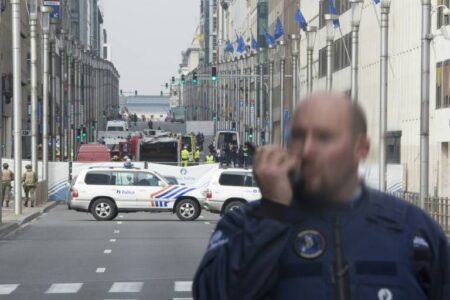
Belgian judges to decide on trial for terror attack suspects
Belgian judges will decide on Tuesday whether to send a dozen suspected jihadist extremists to trial for their alleged roles in the March 2016 Brussels bombings.
Several of the 13 defendants in the Belgian case are also alleged members of the Islamic State cell that carried out the November 2015 attacks in France and left 130 dead.
The best known is 31-year-old Salah Abdeslam, said to be the only surviving member of the group behind the shootings and bombings outside a stadium and in the Bataclan music venue in Paris.
The later bombings of the Brussels airport and a city centre metro station were themselves the worst attacks in Belgium since World War II, killing 32 and wounding 340.
The trial will be a huge undertaking, with the former headquarters of the NATO military alliance refurbished as a high-security courthouse on the outskirts of Brussels.
A panel of judges will meet in closed session Tuesday before deciding whether to follow the advice of federal anti-terrorism prosecutors and ordering a criminal trial.
But the Belgian trial is not expected before the second half of 2022, after a French court deals with the Paris attacks case in a trial between September and the end of March 2022.
For Abdeslam, the Brussels trial would be his second in Belgium.
The Frenchman, who grew up in the Brussels district of Molenbeek, was sentenced in 2018 to 20 years for shooting at Brussels police in the days before his 2016 arrest.
Another alleged member of the cross-border extremis network, Oussama Atar, is thought to have died in Syria since the Paris and Brussels attacks and could be judged in absentia.
Another key suspect is Mohamed Abrini, 36, known as the “man in the hat” after his appearance on security camera footage taken shortly before the Brussels airport bombing.
Two suicide bombers died in the airport blasts, but Abrini was allegedly seen leaving the area. Another accused, Osama Krayem, 28, is accused of accompanying bombers to the metro.
The other accused could face lesser charges of “taking part in the activities of a terrorism group” and some may not face trial at all because of lack of evidence.
Source: Barrons





